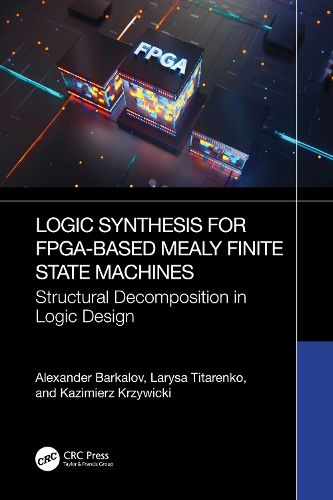Readings Newsletter
Become a Readings Member to make your shopping experience even easier.
Sign in or sign up for free!
You’re not far away from qualifying for FREE standard shipping within Australia
You’ve qualified for FREE standard shipping within Australia
The cart is loading…






This book is devoted to the logic synthesis of field programmable gate array (FPGA)-based circuits of Mealy finite state machines (FSM). Three new methods of state assignment are proposed, which allows obtaining FSM circuits required minimum amount of internal chip resources.
Logic Synthesis for FPGA-Based Mealy Finite State Machines: Structural Decomposition in Logic Design contains several original synthesis and optimization methods based on the structural decomposition of FPGA-based FSM circuits developed by the authors. To optimize FSM circuits, the authors introduce the use of three methods of state assignment: twofold, extended, and composite. These methods allow for the creation of two- or three-level architectures of FSM circuits. The authors also demonstrate how the proposed methods, FSM architectures and synthesis methods can replace known solutions based on either functional decomposition or classical methods of structural decomposition. The authors also show how these architectures have regular systems of interconnections and demonstrate positive features compared to methods based on functional decomposition, including producing circuits with fewer elements that are faster and consume less power than their counterparts. The book includes experimental results proving the efficiency of the proposed solutions and compares the numbers in Look-up Tables (LUTs), showing the performance (maximum operating frequency) and power consumption for various methods of state assignment.
The audience for this book is students, researchers, and engineers specializing in computer science/ engineering, electronics, and telecommunications. It will be especially useful for engineers working within the scope of algorithms, hardware-based software accelerators and control units, and systems based on the use of FPGAs.
$9.00 standard shipping within Australia
FREE standard shipping within Australia for orders over $100.00
Express & International shipping calculated at checkout
This book is devoted to the logic synthesis of field programmable gate array (FPGA)-based circuits of Mealy finite state machines (FSM). Three new methods of state assignment are proposed, which allows obtaining FSM circuits required minimum amount of internal chip resources.
Logic Synthesis for FPGA-Based Mealy Finite State Machines: Structural Decomposition in Logic Design contains several original synthesis and optimization methods based on the structural decomposition of FPGA-based FSM circuits developed by the authors. To optimize FSM circuits, the authors introduce the use of three methods of state assignment: twofold, extended, and composite. These methods allow for the creation of two- or three-level architectures of FSM circuits. The authors also demonstrate how the proposed methods, FSM architectures and synthesis methods can replace known solutions based on either functional decomposition or classical methods of structural decomposition. The authors also show how these architectures have regular systems of interconnections and demonstrate positive features compared to methods based on functional decomposition, including producing circuits with fewer elements that are faster and consume less power than their counterparts. The book includes experimental results proving the efficiency of the proposed solutions and compares the numbers in Look-up Tables (LUTs), showing the performance (maximum operating frequency) and power consumption for various methods of state assignment.
The audience for this book is students, researchers, and engineers specializing in computer science/ engineering, electronics, and telecommunications. It will be especially useful for engineers working within the scope of algorithms, hardware-based software accelerators and control units, and systems based on the use of FPGAs.